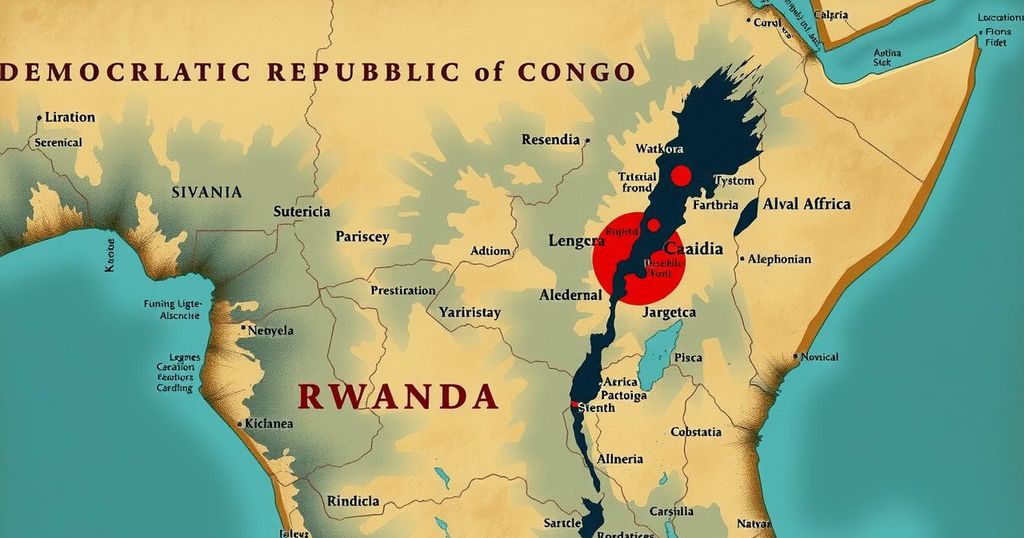World news
” TESONGO, AFRICA, ANGOLA, BORDER SECURITY, CIVIL WAR, CONGO, CONGO (KINSHASA), CORRUPTION, DEMOCRATIC FORCES FOR THE LIBERATION OF RWANDA, DEMOCRATIC REPUBLIC OF CONGO, DRC, FDLR, GOMA, HUMANITARIAN, JOÃO LOURENÇO, JOAO LOURENCO, KAGAME, NORTH AMERICA, PATRICK MUYAYA, PAUL KAGAME, RWANDA, RWANDAN DEFENCE FORCE, SOUTHERN AFRICAN DEVELOPMENT COMMUNITY, TESONGO, UN SECURITY COUNCIL, UNITED STATES, VICTOR TESONGO, WAR
David O'Sullivan
0 Comments
Kagame Expresses Uncertainty Over Rwandan Troops in Eastern DRC Amid Rising Conflict
Rwandan President Paul Kagame stated he is uncertain about troops’ presence in the DRC amid rising tensions and violence linked to the M23 insurgency. The UN estimates thousands of Rwandan soldiers may support the rebels, while DRC officials maintain that evidence of Rwandan involvement is clear. The conflict has seen over 900 fatalities so far, leading to increased military posturing from both Rwanda and the DRC government.
In a recent interview with CNN, Rwandan President Paul Kagame expressed uncertainty regarding the presence of Rwandan troops in the eastern Democratic Republic of Congo (DRC). This region has been engulfed in violence between the M23 rebel group and Congolese forces, resulting in over 900 deaths and thousands injured. Despite international concerns over Rwanda’s alleged support for the M23 rebels, Kagame’s response was vague, given his position as the commander-in-chief of the Rwandan Defence Force.
According to reports by the United Nations, an estimated 3,000 to 4,000 Rwandan soldiers may be operating in the DRC, bolstering M23 forces during recent hostilities. When pressed about this military involvement, Kagame stated, “I do not know,” although he acknowledged Rwanda’s vested interest in regional stability. “There are many things I don’t know,” he elaborated, before asserting that any threats to Rwanda would prompt a protective response from his government.
The situation escalated recently with fatalities in Goma, where UN humanitarian reports indicated that the body count had reached at least 900 since the outbreak of violence. Rebel spokesperson Victor Tesongo, speaking on behalf of M23, dismissed allegations of Rwandan support as a manipulative narrative aimed at discrediting their cause. He emphasized that Rwanda’s priorities lie in combating the Democratic Forces for the Liberation of Rwanda (FDLR), a faction operating alongside the Congolese military.
Patrick Muyaya, the DRC communications minister, countered Kagame’s claims by underscoring that evidence of Rwandan military presence in the DRC is substantial and recognized by various international bodies. “Kagame is the only voice denying this,” Muyaya remarked, highlighting that recent confirmations by UN officials and other leaders reinforce Rwanda’s involvement—claims he described as an “overwhelming international consensus.”
CNN’s Larry Madowo drew parallels between Kagame and Russian President Vladimir Putin regarding military strategies in conflict zones. Kagame downplayed these comparisons, remarking, “There will be so many stories.” He expressed that the narratives surrounding him are beyond his control and reiterated the necessity of ensuring Rwanda’s survival against external challenges.
Kagame characterized the FDLR as an “existential threat” to Rwanda, alleging that this group is supported by the Congolese military. His firm stance on national security was evident; he emphasized that Rwanda remains committed to taking any actions necessary for its protection. “Nobody, including the UN or the international community, is going to do it for us,” he asserted with conviction.
When questioned about potential troop deployments to the DRC, Kagame evaded a direct answer but reiterated Rwanda’s commitment to self-defense. Meanwhile, armed conflict continues to escalate as DRC’s president, Felix Tshisekedi, promised a “vigorous and coordinated response” to M23, whom he accused of being under Rwandan influence. The rebel group has voiced ambitions beyond Goma, publicly stating desires to establish new governance in the region, potentially targeting other provinces and even the DRC capital, Kinshasa, for further expansion.
The interview with President Kagame highlights a significant ambiguity regarding Rwanda’s military involvement in the DRC amidst ongoing conflicts. Tensions remain high, with over 900 lives lost and continued accusations from DRC officials against Rwanda. Kagame maintains a defensive posture, citing self-protection against perceived threats, while the situation could escalate further, inviting additional scrutiny from international observers and entities. This complex regional conflict requires careful attention, not only for immediate resolution but also for its broader implications in Central Africa.
Original Source: www.cnn.com




Post Comment